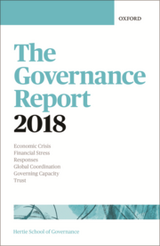Externe Publikationen

Governing capacities after the global financial and economic crisis depleted, refilled, or steady state?
Wegrich, Kai / Sebastian ZiajaExterne Publikationen (2018)
in: Hertie School of Governance (ed.), The Governance Report 2018, Oxford: Oxford Univ. Pr., 47-63
Ten years after the onset of the global financial and economic crisis—the greatest economic stress test since the 1940s—the 2018 edition of the Governance Report examines developments in fiscal policy, administrative capacities, institutional trust, and global governance from before the crisis to current times. By teasing out their implications for governance today, the Report considers how such financial and other global crises of similar magnitude and complexity can be prevented or better managed in the future.This chapter discusses governing capacities. A combination of governing capacities—delivery, regulatory, coordination, and analytical—is required to address complex policy issues and, in particular, crises. Since the onset of the GFC, these capacities developed differently in OECD and G20 countries. In some crisis groups, delivery capacity was not demonstrably affected, but in particular health and education spending as a share of total public expenditures declined on average in the countries that suffered protracted crisis. Trends in regulatory capacity are difficult to detect due to a dearth of valid indicators. Coordination capacity has improved in some countries, but it surprisingly declined in those countries that seem to have dealt well with the crisis. Analytical capacity improved in many countries, which may be a sign of learning and an attempt to generate resilience to future crises.
Kontakt
Cornelia Hornschild
Koordinatorin Publikationen
E-Mail Cornelia.Hornschild@idos-research.de
Telefon +49 (0)228 94927-135
Fax +49 (0)228 94927-130
Alexandra Fante
Bibliothekarin/Open Access-Koordinatorin
E-Mail Alexandra.Fante@idos-research.de
Telefon +49 (0)228 94927-321
Fax +49 (0)228 94927-130



